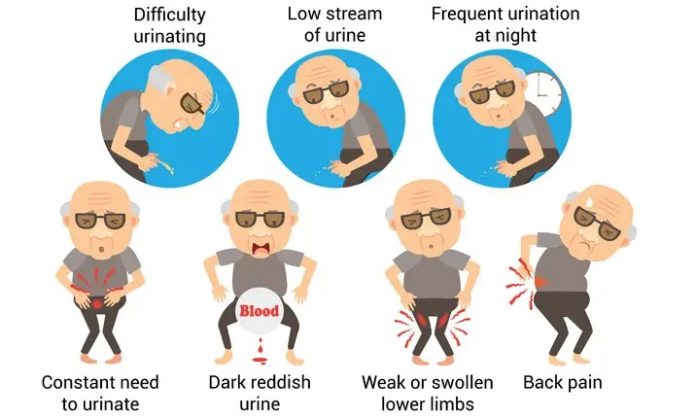A new report published by the peer-reviewed journal Lancet revealed that the number of new prostate cancer cases around the world will more than double over the next two decades as poorer countries catch up with the ageing of richer nations.
It’s not known exactly what causes prostate cancer, although a number of things can increase your risk of developing the condition. These include: age – the risk rises as you get older, and most cases are diagnosed in men over 50 years of age.
Again, prostate cancer is more common in black men than in Asian men.
The report said cases of prostate cancer will rise from 1.4 million in 2020 to 2.9 million by 2040 due to changing age structures and improving life expectancy across the world.
what causes prostate cancer is unknown yet, although a number of things can increase your risk of developing the condition, such as age and race
It projected that the rise in prostate cancer cases cannot be prevented by lifestyle changes or public health interventions alone, saying that governments at all levels need to prepare strategies to deal with it.
The study led by Prof Nicholas James at the Institute of Cancer Research, London, UK, and the Royal Marsden NHS Foundation Trust, London, UK stated that late diagnosis of prostate cancer is widespread but more in Low and Middle Income Countries, where late diagnosis is the norm.
It said, “Prostate cancer is the most common cancer in men in 112 countries, and accounts for 15 per cent of cancers. In this Commission, we report projections of prostate cancer cases in 2040 on the basis of data for demographic changes worldwide and rising life expectancy.
“Our findings suggest that the number of new cases annually will rise from 1·4 million in 2020 to 2·9 million by 2040. This surge in cases cannot be prevented by lifestyle changes or public health interventions alone, and governments need to prepare strategies to deal with it.
late diagnosis of prostate cancer is widespread but more in Low and Middle Income Countries, where late diagnosis is the norm
“We have projected trends in the incidence of prostate cancer and related mortality (assuming no changes in treatment) in the next 10–15 years, and make recommendations on how to deal with these issues.”
It said dealing with this rise in cases will require urgent and radical interventions, particularly in LMICs, including an emphasis on education (both of health professionals and the general population) linked to outreach programmes to increase awareness.
“If implemented, these interventions would shift the case mix from advanced to earlier-stage disease, which in turn would necessitate different treatment approaches: earlier diagnosis would prompt a shift from palliative to curative therapies based around surgery and radiotherapy.
“Although age-adjusted mortality from prostate cancer is falling in HICs, it is rising in LMICs. And, despite large, well known differences in disease incidence and mortality by ethnicity (eg, incidence in men of African heritage is roughly double that in men of European heritage), most prostate cancer research has disproportionally focused on men of European heritage. Without urgent action, these trends will cause global deaths from prostate cancer to rise rapidly,” the study added.


